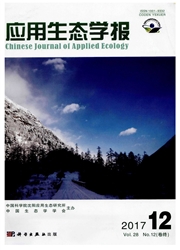

 中文摘要:
中文摘要:
以玉米主栽品种先玉335为试材,研究24-表油菜素内酯(EBR)对低温胁迫下玉米种胚抗氧化能力和低温响应基因表达的影响.结果表明:EBR浸种处理后,玉米种子活力指数和早期幼苗生长显著提高,种胚中超氧自由基(O2-·)含量明显降低,抗氧化酶(包括超氧化物歧化酶SOD、过氧化物酶POD、过氧化氢酶CAT和谷胱甘肽还原酶GR等)活性和非酶类抗氧化物质谷胱甘肽GSH及脯氨酸含量升高,同时促进一氧化氮(NO)的累积,而使用NO清除剂c-PTIO和NO合成酶抑制剂L-NAME处理后,种胚中CAT、POD和脯氨酸含量有所下降,但是外源NO可提高种胚中CAT、POD和脯氨酸的含量,表明EBR诱导的玉米种胚抗氧化能力增加是通过NO介导的.低温胁迫诱导玉米幼胚中P5CS1、CBF1、CBF3和COR15a等基因的表达,EBR处理基因表达进一步提高,而c-PTIO和L-NAME处理基因表达降低;NO供体SNP则提高了这些基因的表达,这表明EBR可能通过NO途径调控低温响应基因的表达.可见,外源EBR可通过NO途径增强玉米种胚抗氧化能力和调控低温响应基因的表达,进而提高低温胁迫的耐受性.
 英文摘要:
英文摘要:
In this study,Xianyu 335,a maize hybrid,was used to investigate the effects of 24-Epibrassinolide( EBR,a synthetic BR) on antioxidant capacity and low-temperature response gene expression in maize embryo germination under low temperature( LT) stress. The germination rate of maize seeds under LT stress was not affected by EBR,but the seed activity index and seedling growth were improved. EBR increased the activities of some antioxidative enzymes including SOD,POD,CAT and GR,and the contents of non-enzymatic antioxidants,such as GSH and proline,and induced the accumulation of nitric oxide( NO). NO scavenging c-PTIO and NOS inhibitor L-NAME decreased but NO donor SNP increased the enzyme activities of CAT and POD,and the content of proline,indicating NO mediated the EBR-induced antioxidant capacity. The gene expression pattern analysis showed that the expression of P5CS1,CBF1,CBF3 and COR15 a was induced by LT stress,and further increased by EBR treatment in maize embryo,while their expression was suppressed by c-PTIO and L-NAME,and improved by SNP,which implied LT-responsed genes were regulated by NO. These results demonstrated that NO was involved in the EBR-induced LT tolerance in maize embryo by modulating the antioxidative capacity and the expression of LT-responsive genes.
 同期刊论文项目
同期刊论文项目
 同项目期刊论文
同项目期刊论文
 期刊信息
期刊信息
